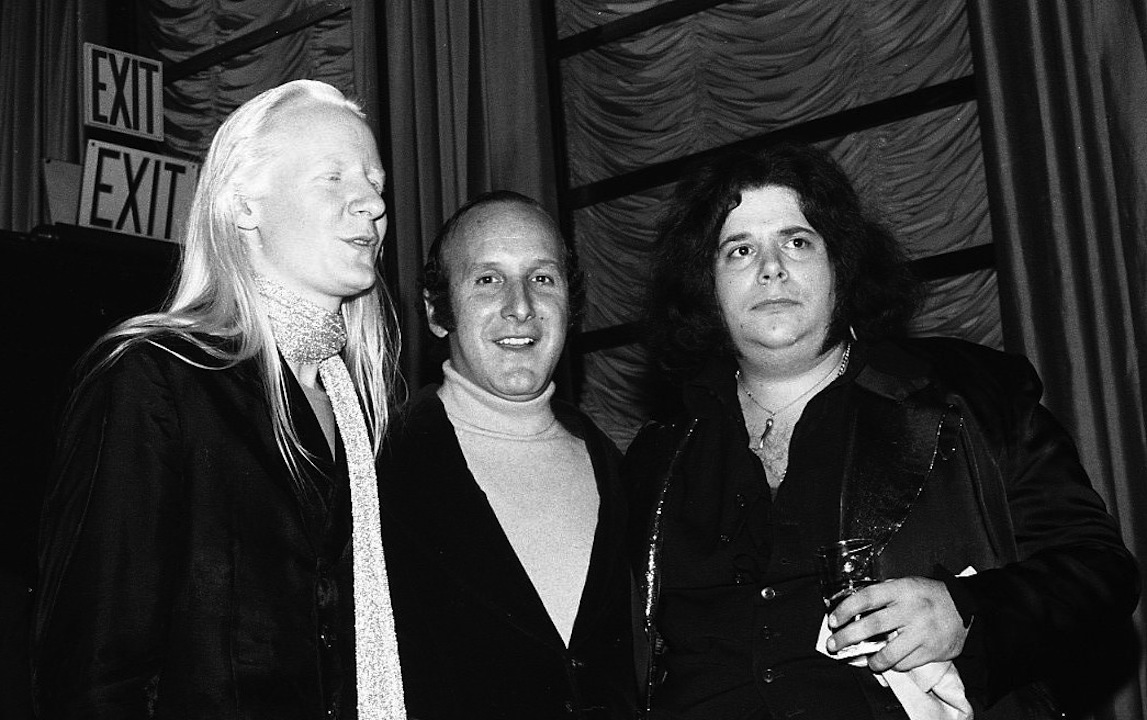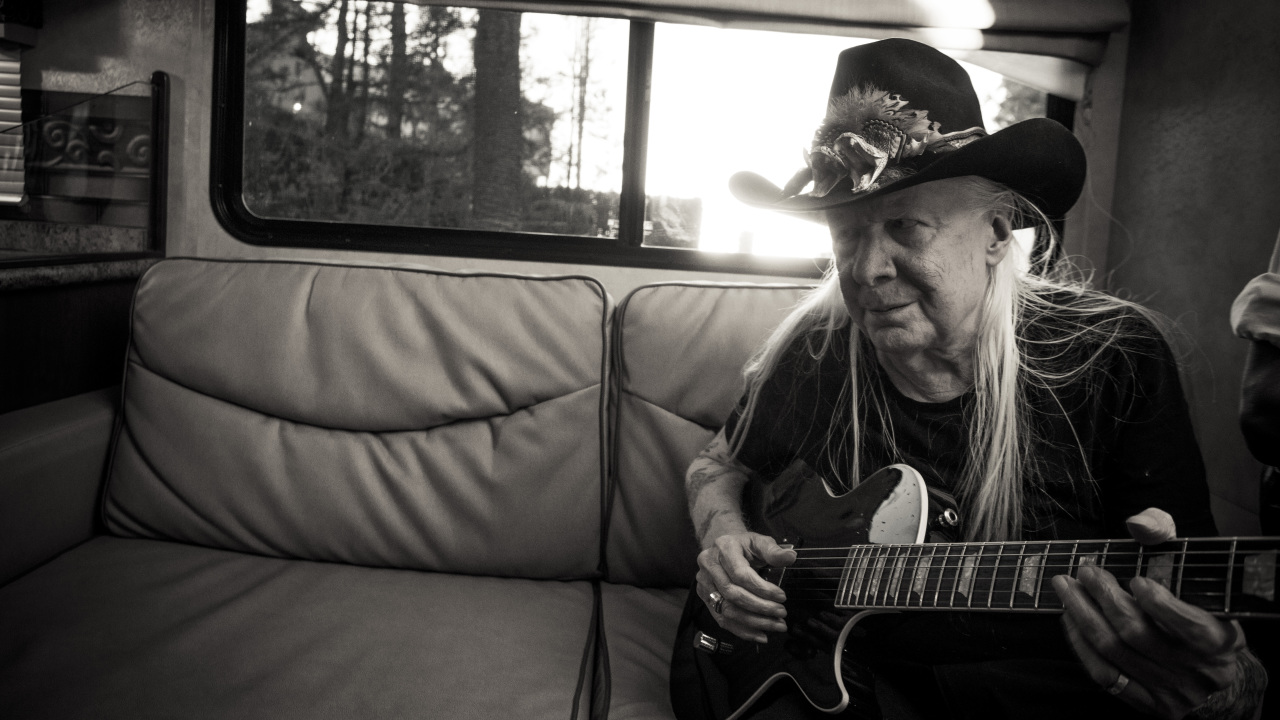Johnny and I first met because we had the same agent in New Hampshire. This was many years ago. So he always knew where I was playing and vice versa. We knew each other, we played with one another quite a bit, but it would be an exaggeration to say that we hung out together on a regular basis, because we didn’t.
It was well known that I had had a heroin problem and had got myself straightened out by taking methadone. Most people do a 28-day detox, but it just makes them realise that they need even less to get them high again. So that’s fucked up, it makes the problem worse. methadone is a horrible drug because it’s like a synthetic morphine. It stays in your bones.
My brother Larry [with whom West would form the pre-Mountain act, The Vagrants] had been on methadone for years. And then, in 1986, after he got clean, he helped me by finding a doctor in New York City. Instead of detoxing in 28 days, I did it over several years, at such a tiny decline [in dosage] that there were no symptoms. I would take just a little bit less each week. Later I realised that I was taking such a very low amount, I guess it was like a placebo.
Legally, though, if you take that path, you’re not allowed to ask the doctor about your dosage. They’ll say: “That’s none of your business.” One day when I asked my brother about how much I was taking, he turned to me and replied: “Les, you’ve been off methadone for six months.” It made me realise that besides the physical aspect, it’s just as much to do with psychological issues.
Cutting to the chase, many years later I was on tour with Johnny Winter, Edgar Winter and Rick Derringer, and we were playing Toronto. The year was 2009. Johnny’s guitar player and manager Paul Nelson came to my dressing room in private and asked how I finally got clean from methadone. Could I do it for Johnny? He was on a really, really high dose. So I told Paul the story, stressing that it was imperative Johnny couldn’t know how many milligrams he was taking. Give him his medication in the form of a wafer that can be dissolved in orange juice and he wouldn’t even know. Just take him down and down and down. Do that and he’ll never realise.
That night in Toronto I jammed on stage with Johnny on the Jimi Hendrix song Red House – it’s out there on YouTube if anyone wants to see it – and carried on with my life. I didn’t give the chat with Paul another thought. If they wanted to follow my path then that would be great, but I couldn’t make them do so, and unless they stuck to my advice, I couldn’t guarantee that it would work.

Anyway, a year or maybe 18 months later we did the same tour again. On the last night, Johnny and Paul came into my dressing room. Johnny said: “I want to thank you.” And I replied: “For what?” It had been so long, I had forgotten the original conversation. Paul told me he’d got Johnny clean. It was the exact situation that I’d gone through with my brother. When Johnny asked how much methadone he was taking, Paul told him: “None, you’re clean. You’ve been clean for months.” He’d opened up a box and shown Johnny all the wafers he hadn’t used.
Johnny was incredibly grateful. Paul told me how, before getting clean, Johnny would just lie around in his hotel room before the show. He had no energy or inclination to do anything else. Now all of a sudden Johnny was up and walking around.
I wish we’d filmed that second conversation. My wife Jenny was there and so were my band, and Johnny and Paul rehashed the whole story of the process they’d gone through. It’s an amazing tale because usually what you’ll hear is a tale of a musician getting high, and here we were talking about cleaning up – twice over.
We stayed in contact through the years. Johnny played on my most recent record, Still Climbing [2013], and I was on his final album, Step Back [2014], which unfortunately came out posthumously. There were so many stars on that record – Eric Clapton, Billy Gibbons, Joe Perry – that it could really have enhanced his reputation. But at least we got to play together again at the end.
I felt that there was such a connection between the two of us as musicians, which usually wouldn’t exist. Johnny and I even discussed sharing our combined story in a book together. It would really have been something if Johnny had told his story and I’d told mine. I guarantee there are a lot of people out there taking methadone that don’t have a clue of how to get off it, and it’s much, much easier than they think. What I’d like people to take away from the stories of Johnny and I, and why I wanted to give this interview, is that it’s possible to get over that fear of being straight. But you can do it – I’m the proof.
Heroin is such a shitty drug. When it gets its claws into you, it won’t let go. When you’re clean, when you finally get there, it’s a whole other different world. You can see a glow in the sky. It’s such a shame that Johnny died, but at least I know he didn’t die from an overdose.
I’m really sorry that Johnny is no longer with us. Thinking about it… my bass player in Mountain, Felix Pappalardi, has been gone for more than thirty years, and now Jack Bruce, who I played with in West, Bruce And Laing, is dead too. Maybe that’ll put people off playing with me in the future.
But one thing’s for sure… I’ll miss Johnny Winter’s playing, and I’m happy that I helped to keep him on this planet for his final years. If I can share that secret, it would make me very proud. It’s like giving somebody a great stocks and shares tip. Even just talking about it again after all of these years, getting it off my chest, I feel so much better.
